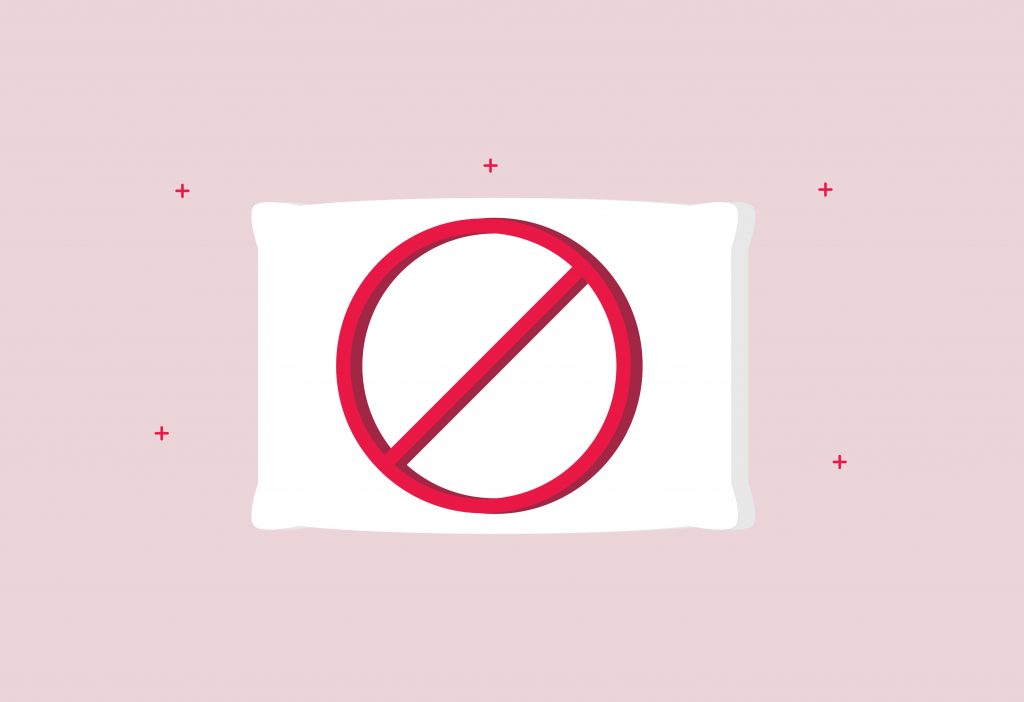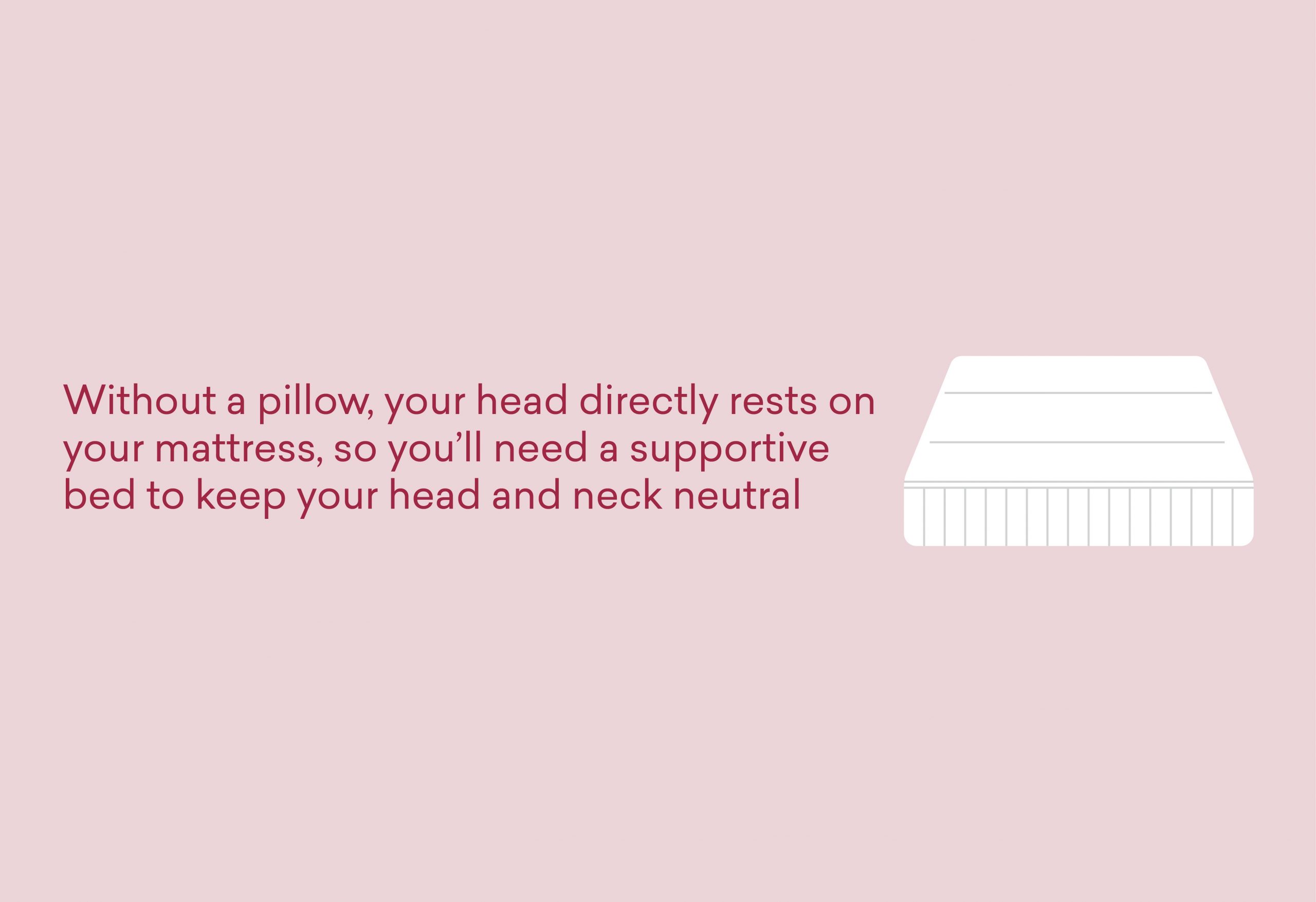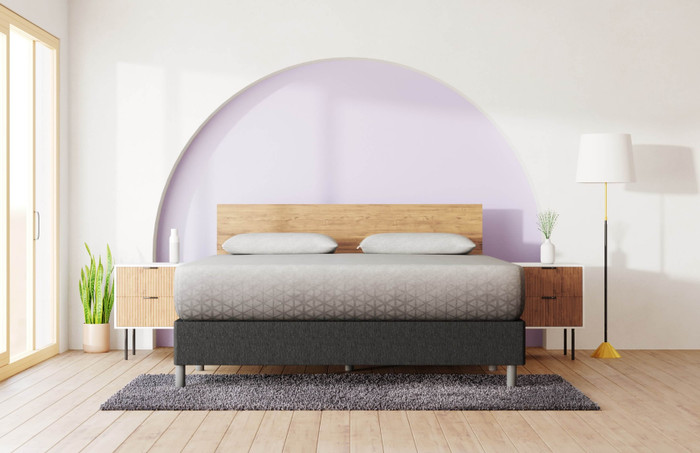Sleeping Without a Pillow

Key Takeaways
- Benefits of Sleeping Without a Pillow: Sleeping without a pillow can promote good posture, soothe neck and back pain, prevent acne and wrinkles, and improve overall sleep quality. Proper spinal alignment and reduced pressure on the neck and back contribute to a comfortable and restful night’s sleep, leading to enhanced physical well-being and reduced fatigue.
- Challenges of Sleeping Without a Pillow: While some individuals may find it beneficial, sleeping without a pillow can be uncomfortable and unsupportive, particularly for side and back sleepers. The lack of head and neck support can lead to spinal misalignment, stiffness, and neck pain, potentially affecting overall sleep quality and physical health.
- Transitioning to Pillow-Free Sleep: For those considering transitioning to sleeping without a pillow, gradual reduction of head support, use of body pillows for support, and investment in a supportive mattress are recommended strategies. By making these adjustments, individuals can effectively align their head and neck without a traditional pillow, ensuring a more comfortable and healthy sleep experience.
Pillows aren’t for show—they help align your spine, soothe headaches, help with snoring, and more. But, sleeping with a pillow isn’t for everyone. Some people may choose to skip the pillow to reduce neck pain, acne, and wrinkles, and help with posture.
Our article shares the pros and cons of sleeping without a pillow. Plus, we discuss how to best transition from using a pillow to going pillow-free!
Benefits of Sleeping Without a Pillow
Sleeping without a pillow has many benefits for sleepers. This includes better posture and sleep, reduced neck pain, and a lower risk of acne and wrinkles.
Promotes Good Posture
Pillows are there to align your spine and promote good posture while you sleep. Good posture is vital to relieving pain, helping you sleep, and fostering a good night’s sleep. But based on your sleeping position, pillows can worsen your posture.
Stomach sleeping isn’t the best position out there, but some people prefer it and that’s okay. Stomach sleeping with a pillow improperly curves your spine, but not using a pillow helps maintain the natural curve of the spine. This way, there’s less stress on your spine and back.
Soothes Neck and Back Pain
With proper spinal alignment comes reduced neck and back pain. There’s less pressure on your neck and back when your spine is aligned. This makes it easier to reduce aches, pains, and stiffness. Long-term, a healthy spine can prevent nerve damage, poor circulation, migraines, and headaches.
However, it’s also possible to ease aches and stiff necks by sleeping with a good pillow for neck pain.
Prevents Acne and Wrinkles
Sleeping without a pillow may reduce your risk of wrinkles and acne. Pressing your face up against a pillow causes dirt and oil build-up on your face. Oil build-up is worse if you don’t wash your pillow or pillowcase regularly.
The dirt clogs your pores and causes facial acne. Similarly, pressing your face into a pillow may cause wrinkles due to the compression.
Improves Sleep
Sleep gives your body time to repair itself. However, being uncomfortable or in pain makes it harder for your body to relax and recover. Poor sleep quality leaves you waking up groggy and fatigued rather than restored.
Proper spinal alignment makes it easier to get comfortable and reduces sleep disruptions. Sleeping well helps you wake up feeling refreshed. Plus, it improves muscle soreness, anxiety, stress, bad mood, and more.
Cons of Sleeping Without a Pillow
While sleeping without a pillow can be helpful, there’s a reason not everyone does it. Going pillow-free gets uncomfortable and isn’t ideal for most sleeping positions.
Uncomfortable for Most Sleeping Positions
Going pillowless is unsuitable for most people. If it were the most comfortable option out there, people wouldn’t be spending hundreds on pillows. Plus, sleeping without a pillow leaves the head and neck unsupported, which is painful.
Unsupportive
The primary reason we use pillows is to keep our heads and necks aligned. Stomach sleepers don’t need the extra support of a pillow to align the head and neck, but back and side sleepers do. The lack of support will throw your spine out of alignment and lead to stiffness and pain.
Causes Neck Pain
While sleeping without a pillow potentially eases neck pain, it can cause or worsen it as well. Sleeping without a pillow can throw your spine out of alignment when you sleep on your side or back, leading to neck pain.

Who Should Sleep Without a Pillow?
While some people believe sleeping without a pillow is the more natural, healthy way of sleeping, it’s not right for everyone. After all, pillows aren’t there for nothing.
The best group of people to go pillowless are stomach sleepers. Stomach sleeping is generally the most unhealthy sleep position because it places pressure on the neck and spine, but it can be difficult to switch sleeping positions overnight. We generally recommend using a very thin and soft pillow when stomach sleeping to prevent neck pain, if not skipping a pillow entirely.
Side and back sleepers may be tempted to go pillowless, but there’s a large gap between their heads and mattresses when they sleep. Leaving this gap empty only causes pain and worsens your quality of sleep.
Side sleepers especially benefit
How to Start Sleeping Without a Pillow
While you may be tempted to drop your pillow and start sleeping without it immediately, you may benefit from making a couple of changes in the meantime. We recommend slowly lowering your head support before going no-pillow, using body pillows, and making sure you have the right mattress for you.
Gradually Reduce Head Support
If you want to sleep without a pillow, it may feel jarring and uncomfortable to switch from a fluffy, thick pillow to nothing at all. Make the transition a bit easier by steadily reducing your head support.
Now, you don’t need ten pillows with different thicknesses to achieve this. Instead, switch out your normal pillow for a folded-up cloth, blanket, or towel and use that under your head. As you adjust to the thinner surfaces over the coming weeks, slowly lower the height of the cloth or blanket by unfolding it.
Eventually, your head and neck will level out with the mattress and you won’t need the extra head support at night.
Use Pillows For Your Body
Rather than tossing out the pillow you once used under your head, consider using it to support other parts of your body. A good way stomach sleepers can utilize pillows for their body is by slipping one under their hips. This reduces the pressure on the lumbar spine and promotes healthy spinal alignment.
Some pillows are specially made for under your hips, but you can use your regular pillow as well. However, we should note the dimensions of a body pillow or knee pillow are often support the body in a way a regular pillow can’t match.
Invest in a Good Mattress
Just because you’re skipping on a pillow doesn’t mean you should skip on support. Without a pillow, your head directly rests on your mattress, so you’ll need a supportive bed to keep your head and neck neutral.
For stomach sleepers, we suggest using a firm mattress to keep your spine in a neutral position and prevent neck pain. Overly soft beds can cause you to sink, curling your spine and neck unnaturally and causing discomfort.
Some good types of mattresses are:
- Memory foam mattresses
- Latex mattresses
- Hybrid mattresses.
All of these beds come in firm variations, so choosing between them really comes down to your personal preference and budget.
Frequently Asked Questions
Is sleeping with a pillow bad for your neck?
Not necessarily. Sleeping with a pillow is important for side and back sleepers to maintain the natural curve of your neck and prevent pain. Conversely, some stomach sleepers might get neck pain when using the wrong pillow. If so, stomach sleepers may choose to go without one to relieve their pain. Otherwise, most sleepers have minimal neck pain when using a pillow.
Does sleeping without a pillow help with sleep apnea?
When struggling with obstructive sleep apnea, stomach sleeping—the only position comfortable without a pillow—isn’t the best position. Having your face pressed up against the mattress further obstructs your breathing, worsening your sleep apnea symptoms.
Side or back sleeping is best for sleep apnea sufferers. So, we recommend using a pillow at night as it keeps your head lifted and your spine aligned. By aligning your body, your airways stay open and make it easy to breathe.
What happens if your pillow is too high?
If your pillow is too high for your sleeping position, it’ll throw your spine out of alignment and your neck will curl in towards your body. This can leave you feeling stiff, sore, and in pain all night long. Being in pain only makes it difficult to sleep, worsening your pain and turning into a vicious cycle of pain and poor sleep.
We always recommend using a pillow that keeps your spine aligned. An overly thick or thin pillow will only leave you uncomfortable.
Why does my pillow hurt my neck?
Your pillow is likely hurting your neck because it is the wrong loft for your needs. Pillow loft refers to how thick your pillow is and finding the right pillow loft comes down to your sleeping position.
A pillow for side sleepers should have a high loft. Meanwhile, back sleepers need mid-loft pillows, and stomach sleepers need low-loft pillows or no pillow at all. If your pillow is overly thin or thick for your sleeping position, it’ll take your neck out of its natural position. Poor spinal alignment leaves your neck sore and can also cause headaches, sleep disruptions, poor circulation, and more.
What is the healthiest pillow to sleep on?
There’s not one healthiest pillow universal for everyone since it varies based on how you sleep. Your sleeping position, budget, and personal preferences also come into play when choosing the best type of pillow for you.
Still, we’ve found that memory foam pillows and latex pillows are popular healthy options for relieving pressure, supporting the neck, and maintaining their shape.
Conclusion
The bottom line is that sometimes sleeping without a pillow does a better job of aligning your head and neck. Stomach sleepers benefit the most from going pillow-free at night as it’ll reduce strain on the neck and lower back. Less pain leads to high-quality, comfortable sleep!
This article is for informational purposes and should not replace advice from your doctor or other medical professional.
Michelle Zhang, Wellness Writer 
Michelle Zhang is a regular contributor to our Zoma blog and is our go-to sleep researcher. In her time with Zoma, Michelle has researched and published many articles on widespread sleeping habits and troubles. In her time outside of Zoma, Michelle is an occupational therapist and long-distance runner. She believes leading a healthy lifestyle is the key to getting better sleep at night. Michelle's work has been featured on Men's Journal, The Frisky, and The Mighty.
View all posts

